Merchant of Venice Act 4, Scene 1 Modern English Translation Meaning Annotations – ICSE Class 10 & 9 English
EnglishMathsPhysicsChemistryBiology
ICSE SolutionsSelina ICSE SolutionsML Aggarwal Solutions
Original Text
Act IV Scene I
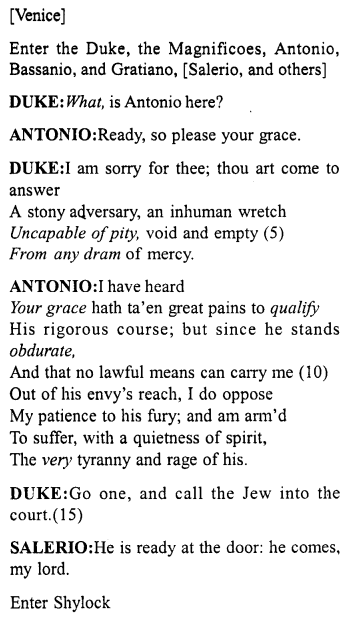
Modern English Reading
Act IV Scene I
DUKE : What, is Antonio here?
ANTONIO : Ready, if it pleases your Grace.
DUKE : I am sorry for you; you are here to answer a rock-like opponent, an in human wretch, inncapable of pity, void and empty of any ounce of mercy.
ANTONIO : I have heard Your Grace has taken great pains to modify his stubborn course; but since he stands solid, and that no lawful means can carry me out of his envy’s reach, I confront his fury with my patience, and I am ready to suffer the very tyranny and rage of his with a quiet spirit.
DUKE : Go, one of you, and call the Jew into the court.
SALERIO : He is ready at the door; he comes, my lord.
Enter Shylock
Word Meaning With Annotation
What : is used to indicate that a question is being asked, and without grammatical connection with the rest of the sentence, uncapable of pity : without the power of feeling pity, from any dram : of the smallest amount, your grace : a title of respect applied to a Duke, qualify : make less severe, obdurate : very hard: unyielding, very : utmost : greatest possible.
Original Text
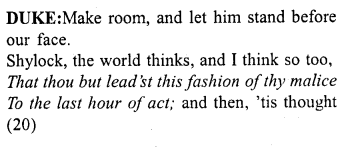
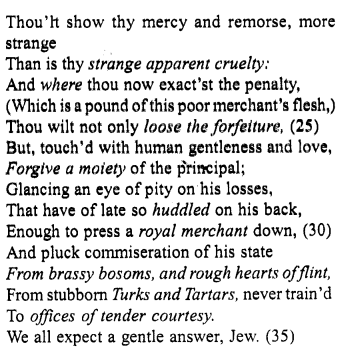
Modern English Reading
DUKE : Make room, and let him stand before us. Shylock. the world thinks, and I think so too, that you only carry this kind of malice to the very last hour of action; and then, it’s thought, You’ll show your mercy and remorse, more strangely than your strange apparent cruelty is; and where you now exact the penalty, which is a pound of this poor merchant’s flesh, you will not only loose the default, but, touched with human gentleness and love, forgive half of the borrowed amount, Glancing with an eye of pity on his losses, that have been so heaped on his back lately, enough to press’a royal merchant down, and get sympathy for his state trom brassy bosoms and rough hearts of stone, trom stubborn Turks and Tartars, never trained to uses of tender courtesy. We all expect a gentle answer, Jew.
Word Meaning With Annotation
hat thou but lead’st this fashion of thy malice, to the last hour of act : that you only continue this cruel course up the last moment, strange apparent cruelty : this strange cruelty of yours, which I think only apparent or assumed . where : whereas, loose the forfeiture : excuse payment of the penalty, forgive a moiety : let him off from paying a certain part of the principal sum. huddled : accumulated; pressed upon, royal merchant : a very great merchant; a prince among merchants, from brassy bosoms, and rough hearts of flint : from hearts as pitiless as brass and as rough as stone. Turks and Tartars : in the vague and imperfect knowledge of Asiatic races which the Elizabethans possess, such people were looked upon as types of barbarians, offices of tender courtesy : obligations imposed by courtesy and kindness.
Original Text
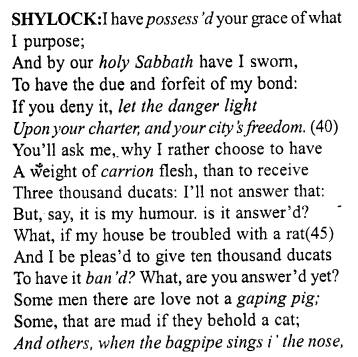
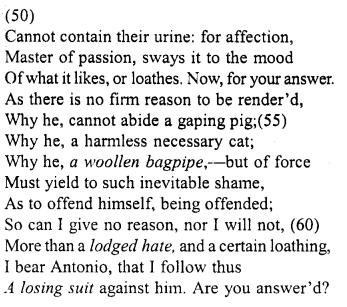
Modern English Reading
SHYLOCK : I have told your Grace of what I: purpose, and, by our holy Sabbath, I have sworn to have the due and penalty of my promise to pay.If you deny it, let the danger light on your city charter and your city’s freedom.You ask me why I would rather choose to have a weight of dead flesh than to receive three thousand dollars. I won’t answer that, only to say I feel like it: have I answered you? What if a rat troubles my house, and I am happy to give ten thousand dollars to have it captured? What, aren’t you answered yet? There are some men that don’t love a dead pig; some that are crazy if they see a cat; and others, when they hear the song of the bagpipe, cannot hold their urine, because sympathy, Mistress of passion, persuades passion to the mood of what it likes or hates. Now, for your answer: As there is no firm reason to be given, Why he can’t stand a dead pig; Why he is afraid of a harmless, necessary cat; Why he wets himself when he hears a wailing bagpipe, only that he must yield by force to such inevitable shame as to offend, himself being offended; So I can give no reason, nor will I, More than I bear Antonio a deep- rooted hate and a certain intense dislike, that I follow a losing suit against him like this. Are you answered?
Word Meaning With Annotation
Posses’ d : informed; told, holy Sabbath : Sunday; the sacred day of the week, let the danger light, Upon your charter, and your city’s freedom : this is a threat to the Duke that some higher power may punish the city, if justice is refused to Shylock. carrion : repulsive and unfit for food; dead, ban’d : poisoned, gaping pig : sometimes a pig was prepared whole for the table, and set on a large dish with a lemon in its mouth, and other, when the bagpipe sings i’ the nose : many people with sensitive ears, do not like the wild notes of the bagpipe, a woollen bagpipe : the bag is usually covered with woollen cloth, to protect the leather from which it is made, lodg’d hate : a hate which has lodged or become rooted in him. a losing suit : a suit in which Shylock suffers financial loss, by refusing to accept his money rather than the pound of flesh.
Original Text
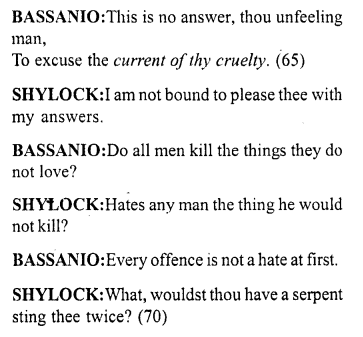
Modern English Reading
BASSANIO : This is no answer, you unfeeling man, to excuse the flowing of your cruelty.
SHYLOCK : I am not required to please you with my answer.
BASSANIO : Do all men kill the things they don’t love?
SHYLOCK : Does any man hate the thing he wouldn’t kill?
BASSANIO : Every wrong is not a hate at first.
SHYLOCK : What! Would you have a serpent sting you twice?
Word Meaning With Annotation
Current of the cruelty : cruel course of action.
Original Text
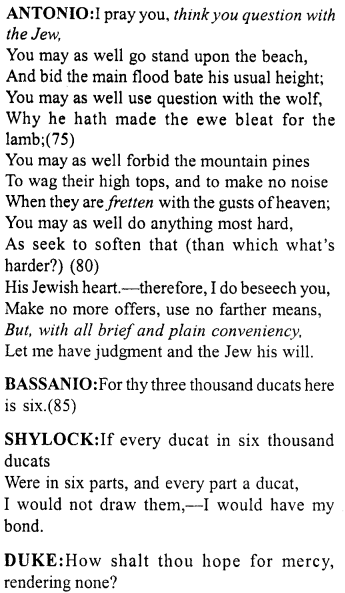
Modern English Reading
ANTONIO : Please, if you think you question the Jew: You may as well go stand on the beach, and ask the main ocean to decrease his usual height; you may as well use questions with the wolf, why he has made the mother sheep cry for the lamb; you may as well forbid the mountain pines to wag their high tops and to make no noise when they are blown by the gusts of wind from the sky; you may as well d° anything almost as hard as to seek to soften that—than what’s harder?— His Jewish heart: so, I beg you, Make no more offers, use no farther means, but with all brief and plain convenience. Let me have judgment, and let the Jew have his default.
BASSANIO : For your three thousand dollars, here are six.
SHYLOCK : If every ducats in six thousand ducats were in six parts, and every part a ducats, I would not take them; I want my promise to pay.
DUKE : How shall you hope for mercy, giving none?
Word Meaning With Annotation
Think you question with the Jew : Do you think you can argue with the Jew? fretten : “agitated by.” but, with all brief and plain conveniency : but briefly and without ceremony, as is there convenient, etc.
Original Text
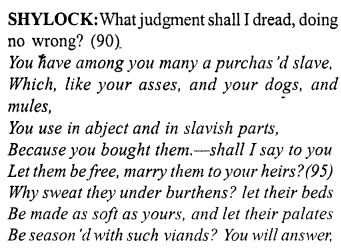
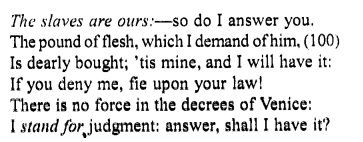
Modern English Reading
SHYLOCK : What judgment shall I dread, if I; have done no wrong? You have many purchased slaves among you, which, like your asses and your dogs and mules, you use in low and in slavish ways, because you bought them; shall I say to you” Let them be free, damn them to your heirs?” Why do they sweat under burdens? Let their beds be made as soft as yours, and let their palates be seasoned with such rich meats? You will answer” the slaves are ours.” So I answer you: the pound of flesh which I demand of him is dearly bought; it’s mine, and I will have it. If you deny me, damn your law! There is no backbone in the laws of Venice. I stand for judgment: answer; shall I have it?
Word Meaning With Annotation
You have among you many a purchas’d slave, which like your asses, and your dogs and mules You use in abject and in slavish parts, Because you bought them. Shall I say to you, Let them be free, marry them to your heirs? Why sweat they under burthens? Let their beds, Be made as soft as yours, and let their palates, Be seasoned with such viands? You will answer, “The slaves are ours” : Shylock argues that it is a common practice to keep slaves, and many in the court do so. The slaves are regarded as the property of the owner, and may be treated in any manner. Similarly this pound of flesh is his own property, and he may do what he likes with it without being brought to account. This passage shows well the unyielding and determined nature of Shylock, as well as the cruelty of his nature, parts : duties, stand for : claim; demand as my right.
Original Text
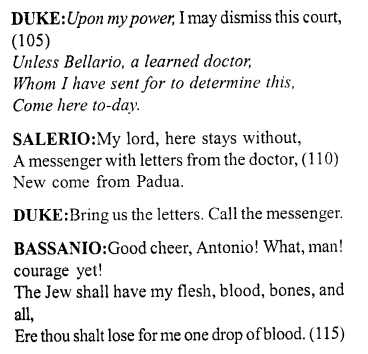
Modern English Reading
DUKE : I may dismiss this court by my power, Unless Bellario, a learned doctor, whom I have sent for to determine this, comes here today.
SALERIO : My lord, there is a messenger waiting outside with letters from the doctor, just now arrived from Padua.
DUKE : Bring us the letters; call the messenger.
BASSANIO : Cheer up, Antonio! What, man, have courage still! The Jew shall have my flesh, blood, bones, and everything, before you shall lose one drop of blood for me.
Word Meaning With Annotation
Upon my power : by virtue of the authority I possess, unless Bellario, a learned doctor, whom I have sent for to determine this, come here to-day : It is strange that Portia should think at once of Bellario, and then the Duke conveniently sends for him and makes it possible for Portia to come as his representative. The possibility of the Duke sending for some other learned lawyer makes us wonder how Portia would then have gained admission to the court. But it is futile to approach the drama as if we were speaking of actual life and human characters, and we must accept that this is what happened. It is possible that the messenger who brought the news to Belmont may have mentioned there that the Duke had sent for Bellario. determine : arrive at a decision, this come : just arrived.
Original Text
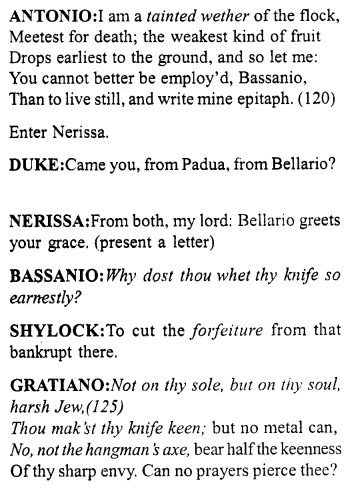
Modern English Reading
ANTONIO : I am a poisoned, castrated ram of the flock, most ready for death; the weakest kind of fruit drops first to the ground, and so let me. You cannot be better employed, Bassanio, than to live on, and write my epitaph.
Enter Nerissa.
DUKE : Did you come from Padua, from Bellario?
NERISSA : From both, my lord. Bellario send greetings to your Grace.
BASSANIO : Why do you sharpen your knife so earnestly?
SHYLOCK : To cut the default from that bankrupt there.
GRATIANO : You make your knife sharp, not on the sole of your shoe, but on your soul, harsh Jew, but no metal can, no, not the hangman’s axe, be sharpened to half the sharpness of your sharp hate. Can any prayers get through to you?
Word Meaning With Annotation
Tainted wether : an old and infirm sheep, why dost thou whet thy knife so earnestly : the actor who plays the part of Shylock bends down and proceeds to sharpen the edge of his knife upon the leather sole of his shoe, forfeiture : that which has been forfeited, or the flesh. Not on the sole: but on thy soul harsh Jew, Thou mak’st thy knife keen : the Old English word for soul was sawol. While the spelling had changed by the time of Shakespeare it is possible that it was pronounced rather like “sowl”, to rhyme with “howl.” No, not the hangman’s axe : the official who executed condemned men was called the “hangman”. Low bom criminals or men charged with ordinary offences were executed by hanging. But noble or political prisoners would be beheaded with an axe, manipulated by the same hangman.
Original Text
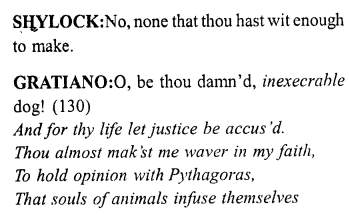
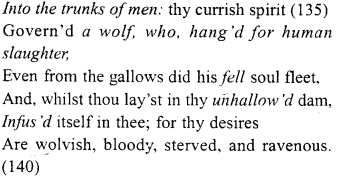
Modern English Reading
SHYLOCK : No, none that you have sense enough to make.
GRATIANO : Oh, damn you, stubborn dog! And, for your life, let justice be blamed. You almost make me change my mind, about agreeing with Pythagoras that the souls of animals send themselves into the bodies of men. Your dog-like spirit that must have been ruled by a wolf hanged for killing a human, his evil soul falling quickly even from the gallows, and, while you lay in your unholy mother, sent itself into you, because your desires are wolfish, bloody, starved, and hungry.
Word Meaning With Annotation
Inexecrable : ‘inexecrable’ “too bad for execration.” and for thy life let justice be accus’d : and we must accuse the spirit of Justice for allowing you to live, thou almost mak’st me waver in my faith, To hold opinion with Pythagoras, That souls of animals infuse themselves, Into the trunks of men : Pythagoras was a Greek philosopher who believed that souls of men or animals appeared several times on the earth, assuming sometimes higher and sometimes lower forms of life, a Wolf, who hang’d for human slaughter : In the olden days it was not uncommon for animals to be formally executed like criminals, fell : fierce; cruel, unhallowed : wicked; vile. Infus’d itself in thee : poured itself into the body.
Original Text
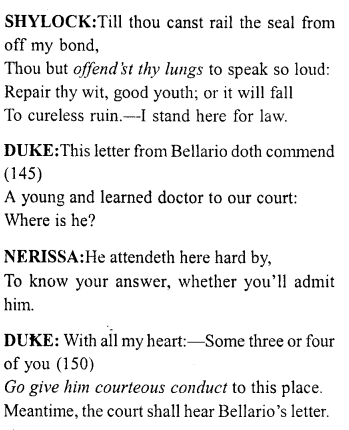
Modern English Reading
SHYLOCK : Until you can scream the seal from off my promise to pay, you only insult your lungs to speak so loud; fix your brain, good youth, or it will fall to cure less ruin. I stand here for law.
DUKE : This letter from Bellario recommends a young and learned doctor to our court. Where is he?
NERISSA : He waits very nearby, to know your answer, whether you’ll admit him.
DUKE : With all my heart: some three or four of you go, give him courteous conduct to this place. In the meantime, the court shall hear Bellario’s letter.
Word Meaning With Annotation
Offend’st thy lungs : injure your lungs; put them to useless labour, go give him courteous conduct: Go and conduct him on a friendly visit.
Original Text
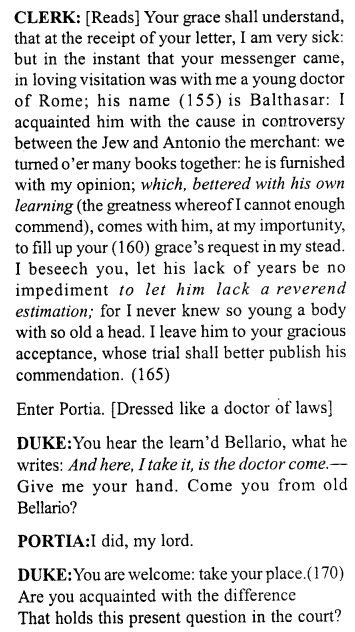
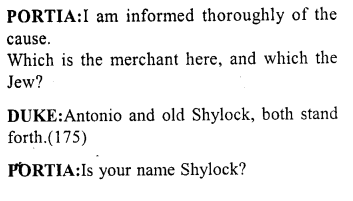
Modern English Reading
CLERK : “Your Grace shall understand that, at the receipt of your letter, I am very sick; but, just as your messenger came, a young doctor from Rome was visiting with me; his name is Balthazar. I acquainted him with the cause of the controversy between the Jew and Antonio the merchant; we looked over many books together; he is furnished with my opinion which, made better with his own learning,—the greatness of which I can not recommend enough, comes to fulfill your Grace’s request in my place because of my illness. Please don’t let his youth be animpediment to giving him the utmost respect, because I never knew so young a body with so old a head. I leave him to your gracious acceptance, whose testing shall better prove his abilities.”
Enter Portia. [Dressed like a doctor of laws]
DUKE : You hear what the learned Bellario has written; and here, I take it, is the doctor coming. Give me your hand; do you come from old Bellario?
PORTIA : I did, my lord.
DUKE : You are welcome; take your place. Are you acquainted with the difference of opinion that is the present question before the court?
PORTIA : I am thoroughly informed about the case. Which is the merchant here, and which the Jew? 1
DUKE : Antonio and old Shylock, both come forward.
PORTIA : Is your name Shylock?
Word Meaning With Annotation
Which, bettered with his own learning : and this opinion I have given him, strengthened by his own learning etc. to let him lack a reverend estimation : in depriving him of your respectful opinions, and here, I take it, is the doctor come : the word “doctor” was the title of respect paid to a distinguished teacher or lawyer.
Original Text
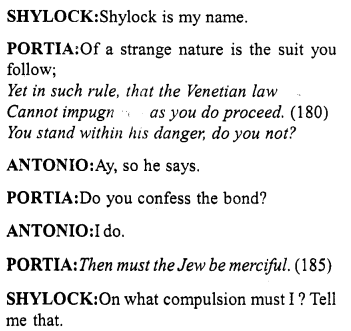
Modern English Reading
SHYLOCK : Shylock is my name.
PORTIA : You pursue a suit of a strange nature, still, in such rule of law, that the Venetian law cannot fight against you as you proceed. You stand in his danger, don’t you?
ANTONIO : Yes, so he says.
PORTIA : Do you confess the promise to pay?
ANTONIO : I do.
PORTIA : Then must the Jew be merciful.
SHYLOCK : On what compulsion must I ? Tell me that.
Word Meaning With Annotation
Yet in such rule, that the Venetian law cannot impugn you as you do proceed : “Yet it is in accordance with the rules, and the Law of Venice cannot attack you for bringing the case”. I do not think it has been pointed out by anyone that Portia later reverses this opinion, for her final decision which makes Shylock into the accused instead of the accuser, is that the very nature of the suit constitutes a conspiracy against the life of a citizen, you stand within his danger, do you not : You admit having incurred this dangerous liability, do you not? then must the Jew be merciful : by “must” Portia means, “according to the ordinary laws of humanity and kindness, you must.” But Shylock takes it up as meaning legal compulsion, and asks her to explain why he must do so.
Original Text
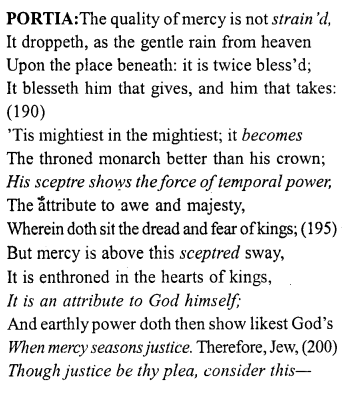
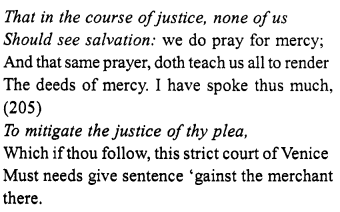
Modern English Reading
PORTIA : The quality of mercy is not restricted; It drops as the gentle rain from heaven on the place beneath the clouds. It is twice blessed: It blesses him that gives mercy and him that takes mercy. It’s most powerful in the most powerful people; it suits the throned king better than his crown; his royal wand shows the force of earthly power, the quality to amaze and rule, where the dread and fear of kings sits; but mercy is above the wave of this wand, it sits on a throne in the hearts of kings, it is a quality of God himself; and earthly power then shows itself like God’s when mercy goes with justice. So, Jew, though justice is your plea, consider this, that if we all got justice, none of us would see salvation; we pray for mercy, and that same prayer teaches us all to do the deeds of mercy. I have spoken this much to soften the justice of your plea, which if you follow, this strict court of Venice must give a ruling against the merchant there.
Word Meaning With Annotation
Strain’d : forced; compelled, becomes : adorns; renders beautiful, his sceptre shows the force of temporal power : his sceptre is the emblem of worldly power, temporal means, in this sense, “worldly” as opposed to “heavenly.” sceptred sway : the worldly rule which is symbolised by the sceptre, it is an attribute to God himself : it is a divine quality, and one which God Himself possesses, when mercy seasons justice : when mercy lessens the severity of justice, though justice be thy plea, consider this, That in the course of justice, none of us, Should see salvation : this is a statement of the Christian doctrine that we are all sinners, and therefore must throw ourselves on God’s mercy. If we were judged with strict justice, not one of us would deserve heavenly happiness, to mitigate the justice of thy plea : to persuade you to put forward a milder demand than that for strict justice.
Original Text
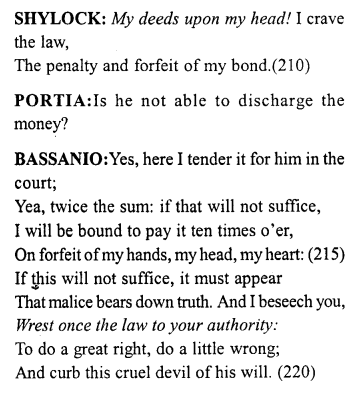
Modern English Reading
SHYLOCK : My deeds on my head! I want the law, the penalty, and penalty of my promise to pay.
PORTIA : Is he unable to repay the money?
BASSANIO : Yes; here I brought it for him into the court; Yes, twice the sum; if that is not enough, I’ll swear to pay it ten times over on penalty of the loss of my hands, my head, my heart; If this is not enough, it must seem that evil wins over truth. And, I beg you, twist the law once to your authority; to do a great right, do a little wrong, and deprive this cruel devil of his will.
Word Meaning With Annotation
My deeds upon my head : may the consequences of my acts fall on my head. Wrest once the Law to your authority : for one occasion, use your authority to change the course of the law.
Original Text
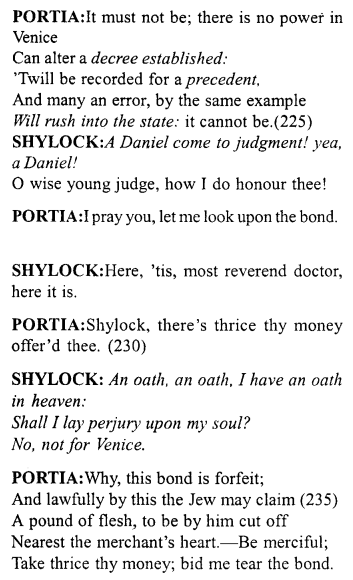
Modern English Reading
PORTIA : It must not be; there is no power in Venice that can change an established law; it will set a precedent, and many errors by the same example will rush into the state. It cannot be.
SHYLOCK : A prophet from the Bible come to judgment! Yes, a prophet! Oh, wise young judge, how I honor you!
PORTIA : Please, let me look on the promise to pay.
SHYLOCK : Here it’s, most reverend doctor; here it is.
PORTIA : Shylock, there’s three times your money offered to you.
SHYLOCK : An oath, an oath! I have an oath in heaven. Shall I lay perjury on my soul? No, not for Venice.
PORTIA : Why, this promise to pay is penalty; and lawfully the Jew may claim a pound of flesh by this, to be by him cut off nearest the merchant’s heart. Be merciful. Take three times your money; ask me to tear up the promise to pay.
Word Meaning With Annotation
Decree established : a law which is fixed and on the statute book, precedent : an example which might be followed by other judges, will rush into the state : will speedily appear in the business of the State. A Daniel come to judgement, yea a Daniel : Daniel, one of the great Jewish characters of the Old Testament, was a man famed for wisdom and sound judgment. Shylock takes his name here as a representative or type of the perfect judge. An oath, an oath, I have an oath in heaven. Shall I lay perjury upon my soul? No not for Venice : Shylock gives us an additional reason that he has sworn a sacred oath (in the Jewish synagogue) not to be dissuaded from exacting what is due under the bond. This oath he cannot break, without committing a serious sin against his religion.
Original Text
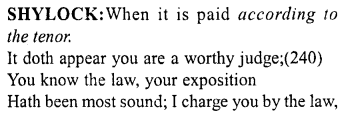
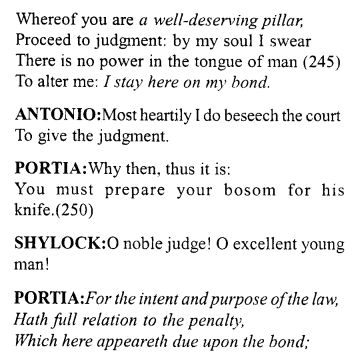
Modern English Reading
SHYLOCK : When it is paid according to the terms. It appears you are a worthy judge; you know the law; your explanation has been most sound; I charge you by the law, of which you are a well-deserving upholder, proceed to judgment. By my soul, I swear there is no power in the voice of man to change my mind. I wait here on my promise to pay.
ANTONIO : Most heartily I beg the court to give the judgment.
PORTIA : Why then, it is like this: You must prepare your chest for his knife.
SHYLOCK : Oh, noble judge! Oh, excellent young man!
PORTIA : Because the intent and purpose of the law has full relation to the penalty, which appeared here due on the promise to pay.
Word Meaning With Annotation
According to the tenour : according to the strict wording and meaning, a well deserving pillar : “a worthy representative.” Shylock says that Portia is an equally strong supporter of the structure of the law. i stay here on my bond : I base my claim strictly on my bond, for the intent and purpose of the law, hath full relation to the penalty, which here appeareth due upon the bond : for the object and working of this particular law is quite applicable to the special penalty which is set forth here.
Original Text
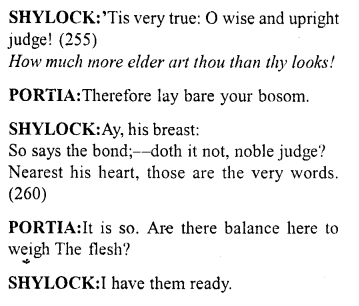
Modern English Reading
SHYLOCK : It’s very true. Oh, wise and upright judge, how much more older are you than your looks!
PORTIA : So, bare your chest.
SHYLOCK : Yes, “his breast:” So says the promise to pay:— does it not, noble judge?—” Nearest his heart:” those are the very words.
PORTIA : It is true. Are there scales here to weigh The flesh?
SHYLOCK : I have them ready.
Word Meaning With Annotation
How much more elder art thou than thy looks : Shakespeare frequently uses a double comparative or superlative form of the adjective, often for emphasis. We should take elder here as meaning “wise”, i.e. you show more wisdom than would be expected from your youthful appearance.
Original Text
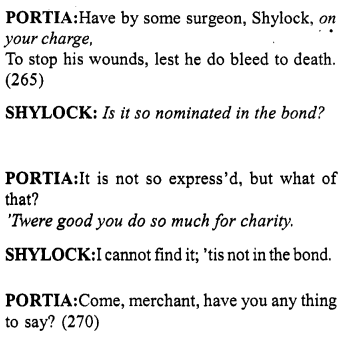
Modern English Reading
PORTIA : Have some surgeon nearby, Shylock, on your responsibility, to stop his wounds, so that he won’t bleed to death.
SHYLOCK : Is it so stated in the promise to pay?
PORTIA : It is not expressly stated; but so what? It would be good for you to do so much for charity.
SHYLOCK : I cannot find it; it’s not in the promise to pay.
PORTIA : You, merchant, have you anything to say?
Word Meaning With Annotation
On your charge : at your expense. Is it so nominated in the bond : this line is effective in destroying sympathy for Shylock, and was probably designed by Shakespeare to have that effect. Not only is Shylock determined to have Antonio’s life, but he wishes to do so in as cruel a manner as possible, and will not spare him any of the pain accompanying the penalty. Twere good you do so much for charity : again Portia attempts to make Shylock think of the law of human kindness, and not only of the law of the court. But he refuses to show any sign of compassion, and will not accept the opportunities of relenting which Portia gives him.
Original Text
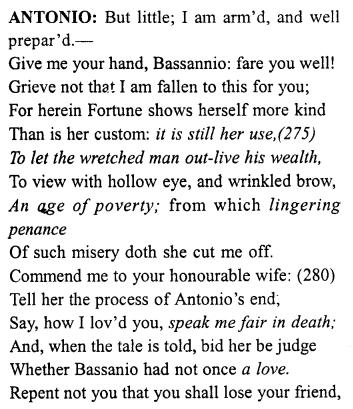
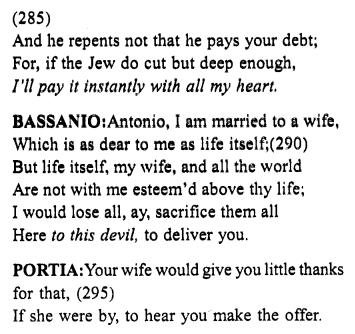
Modern English Reading
ANTONIO : Only little: I am ready and well prepared. Give me your hand, Bassanio: goodbye! Don’t grieve that I am doing this for you, because here fortune shows herself more kind than is her habit: it is still her habit to let the wretched man out live his wealth, to view an age of poverty with hollow eye and wrinkled brow; she cuts me off from the lingering repentance of such misery. Commend me to your honorable wife: Tell her the story of Antonio’s end; Say how I loved you; speak fairly about me in death; and, when the tale is told, ask her to be the judge of whether Bassanio didn’t once have a love. Only be sorry that you shall lose your friend, and he is not sorry that he pays your debt; because if the Jew only cuts deep enough, I’ll pay it instantly with all my heart
BASSANIO : Antonio, I am married to a wife who is as dear to me as life itself; but life itself, my wife, and all the world, are not worth more to me than your life; I would lose everything, yes, sacrifice them all here to this devil, to save you.
PORTIA : Your wife would give you little thanks for that, if she were here to listen to such an offer.
Word Meaning With Annotation
It is still her use, to let the wretched man out-live his wealth : fortune often ruins a man, and allows him to live on in miserable poverty after his wealth has gone, but she is more kind to Antonio in mercifully allowing him to die at the same time, an age of poverty : the prospect of spending his old age in poverty. lingering penance : prolonged suffering, speak me fair in death : speak well of me to her after I am dead, a love : a friend who felt deep love. I’ll pay it instantly with all my heart : even in the moment of tragedy, Shakespeare makes Antonio speak with grim humour, using the double meaning which characterised the wit of the day. “With all my heart” means in the first place, “With the utmost willingness.” But there is the literal meaning that the Jew would cut out the whole of Antonio’s heart as part of the pound of flesh. This is a tense moment, but it is relieved by this humorous remark. The courageous character of Antonio and his frank manliness make a sharp contrast with the malice of the Jew. to this devil : from this devil.
Original Text
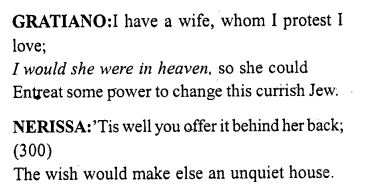
Modern English Reading
GRATIANO : I have a wife whom, I protest, I love; I wish she were in heaven, so she could beg some power to change this currish Jew.
NERISSA : lt’s well you offer it behind her back; the wish would other make a noisy house.
Word Meaning With Annotation
I would she were in heaven : I wish that she were dead, so that her soul in Heaven might intercede with the Divine Powers to change the conduct of the vile Jew.
Original Text
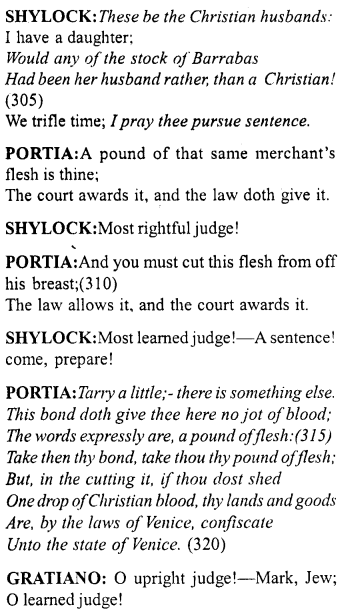
Modern English Reading
SHYLOCK : These are the Christian husbands! I have a daughter; would any of the stock of Barabbas the thief had been her husband, rather than a Christian! We are wasting time; Please, enforce sentence.
PORTIA : A pound of that same merchant’s flesh is yours. The court awards it and the law gives it.
SHYLOCK : Most rightful judge!
PORTIA : And you must cut this flesh from off his breast. The law allows it and the court awards it.
SHYLOCK : Most learned judge! A sentence! Come, get ready.
PORTIA : Wait a minute; there is something else.This promise to pay does not give you here a jot of blood; the words expressly are “a pound of flesh:” Then take your promise to pay, take your pound of flesh; but, in the cutting it, if you shed one drop of Christian blood, your lands and goods are, by the laws of Venice, seized by the state of Venice.
GRATIANO : Oh, upright judge! Mark, Jew: Oh, learned judge!
Word Meaning With Annotation
These be the Christian husbands : to Shylock, the words of Bassanio and Gratiano appear unnatural, and he infers “That shows how little Christian husbands think of their wives.” would any of the stock of Barrabas, Had been her husband, rather than a Christian : Barabbas was a murderer in the Bible, and murder is a crime which is particularly rare and greatly abhorred among the Jews. Yet Shylock says that he would have preferred to see Jessica married to a descendant of Barabbas, rather than a Christian. I pray thee pursue sentence : Carry out the sentence, please! Tarry a little—there is something else, this bond doth give thee here no jot of blood; the words expressly are, a pound of flesh; take then thy bond, take thou thy pound of flesh; but, in the cutting it, if thou dost shed one drop of Christian blood, thy lands and goods are, by the laws of Venice, confiscate unto the state of Venice : the turning point in the events of the trial scene, it is introduced without a moment’s warning. Just when Antonio’s case seems hopeless, Portia changes the aspect of the situation completely by the restriction which she places upon Shylock. Tragedy is averted; the audience is shown at once that the tension is over, and all breathe freely again. The atmosphere almost becomes that of comedy for an Elizabethan audience. But a modem audience would not find comedy in the crushing humiliation of Shylock. jot : tiny particle.
Original Text
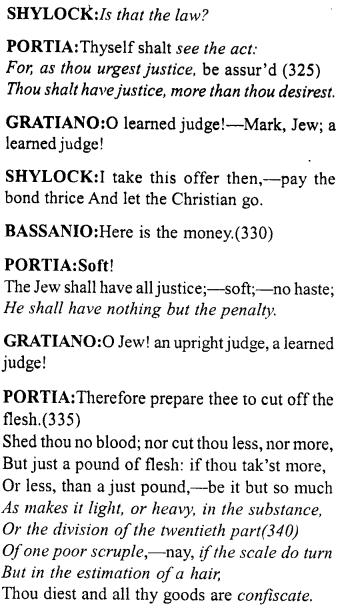
Modern English Reading
SHYLOCK : Is that the law?
PORTIA : You yourself shall see the law; because, as you insist on justice, be assured you shall have justice, more than you desire.
GRATIANO : Oh, learned judge! Mark, Jew: a learned judge!
SHYLOCK : I take this offer then: pay the promise to pay three times, and let the Christian go.
BASSANIO : Here is the money.
PORTIA : Wait! The Jew shall have all justice; wait! ‘Don’t hurry:—He shall have nothing but the penalty.
GRATIANO : Oh, Jew! an upright judge, a learned judge!
PORTIA : So, get ready to cut off the flesh. Don’t shed any blood; or cut less nor more, exactly just a pound of flesh: if you take more, or less, than a just pound, whether it is only so much that makes it light or heavy in the substance, or the division of the twentieth part of one poor scruple; no, if the scale turns only by a hair, you die, and all your goods are seized.
Word Meaning With Annotation
Is that the law : Shylock speaks in utter bewildennent, and appears a comic, hesitating figure on the stage, with all his arrogance and confidence gone, see the act : see it put into execution, for, as thou urgest justice, be assur’d thou shalt have justice, more than thou desirest : the sense is “You have been insisting on the literal reading of the law. Well, you shall have the same kind of law yourself, as much_as you can possibly desire.” he shall have nothing but the penalty : having led Shylock into the trap, Portia is determined not to let him offlightly. He was afforded numerous opportunities of withdrawing with a profit before this; now the tables are completely turned, and he who would show no mercy to Antonio is to have none himself, as makes it light or heavy in the substance : “As will make the amount of it light or heavy.” or the division of the twentieth part of one poor scruple : the word “or” seems to connect this with the previous line as an alternative. It is a repetition of the previous line, and the general sense is “ or if it varies from an exact pound by the twentieth part of a scruple.” A scruple was a very small unit of weight, if the scale do turn but in the estimation of a hair : “if it is estimated that one side of the scale varies from the other by as much as a hair’s breadth.” confiscate : an old past participle, equal to “confiscated”
Original Text
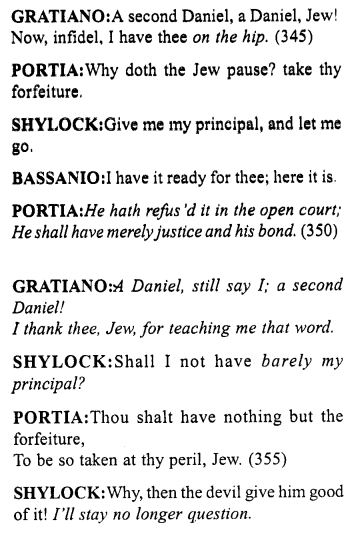
Modern English Reading
GRATIANO : A second Daniel, a Daniel, Jew! Now, infidel, I have you at a disadvantage.
PORTIA : Why does the Jew wait? Take your penalty.
SHYLOCK : Give me my principal, and let me go.
BASSANIO : i have it ready for you; here it is.
PORTIA : He has refused it in the open court; He shall merely have justice, and his promise to pay.
GRATIANO : A Daniel still say I; a second Daniel! I thank you, Jew, for teaching me that word.
SHYLOCK : Shall I not have just my principal?
PORTIA : You shall have nothing but the penalty to be so taken at your own risk, Jew.
SHYLOCK : Why, then the devil give him good of it! I’ll wait no longer.
Word Meaning With Annotation
On the hip : this phrase is taken from wrestling. To have a man “on the hip” meant to secure such a hold on him that he was helpless, and could be easily thrown by his opponent, he hath refus’d it in the open court; he shall have merely justice and his bond : Shylock is willing to receive back his three thousand ducats and depart. Many would think that his defeat is sufficiently great, and that his humiliation need not be increased. Shakespeare evidently thought otherwise, and prepared a much heavier punishment for the Jew. A Daniel, still say I; a second Daniel! I thank thee, Jew, for teaching me that word : Gratiano exultingly quotes Shylock’s own words, and says “I thank you, Shylock, for supplying me witlvsuch an appropriate illustration.” The atmosphere of this law court seems free and easy, and the freedom of speech afforded the spectators surprises us. Barely my principal : my principal alone without any interest. I’ll stay no longer question : I shall not remain here for any further talk.
Original Text
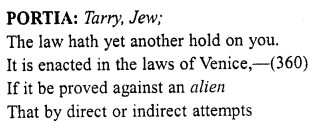
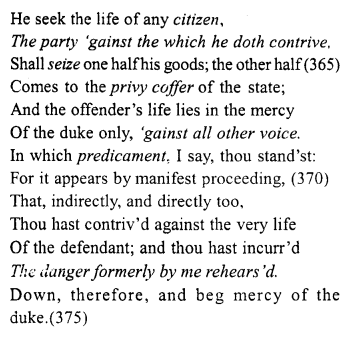
Modern English Reading
PORTIA : Wait, Jew. The law has yet another hold on you. It is enacted in the laws of Venice, that, if it is proved against an alien that by direct or indirect attempts he seek the life of any citizen, the party against whom he schemes shall seize one half his goods; the other half comes to the public treasury of the state; and the offender’s life lies at the mercy of the Duke only, above all others. In which predicament, I say, you stand; because it appears by this obvious proceeding that indirectly, and directly too, you have schemed against the very life of the defendant; and you have incurred the danger that I just read to you. So, kneel down, and beg mercy of the Duke.
Word Meaning With Annotation
Tarry Jew : on the stage, Shylock is shown as startled by those words, wondering what fresh development is to come, alien : person not a native of Venice, citizen : a native of Venice, the party ‘gainst the which he doth contrive : this is in imitation of the language of the law. Portia may be supposed to quote from the exact words of this particular law, “against the which” is particularly typical of the affected working of legal documents. It is thought that Shakespeare served at one time of his life in a lawyer’s office, and it is his accurate knowledge of legal terms which lends some show of probability to the ; theory, contrive : conspire; plot, seize : “take possession of’ or “become entitled to.” privy coffer : the state treasury, ‘gainst all other voice : no other person except the Duke has power to decide whether the offender shall live or die. predicament : difficult situation; position, the danger formerly by me rehears’d : the penalties which I have just stated.
Original Text
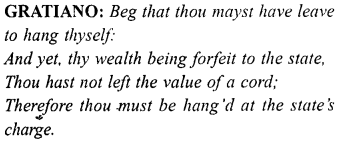
Modern English Reading
GRATIANO : Beg that you may have permission to hang yourself; and still, your wealth being the penalty to pay the state, you haven’t got the value of a string left; So you must be hanged at the state’s expense.
Word Meaning With Annotation
Beg that thou mayst have leave to hang thyself; and yet, thy wealth being forfeit to the state, thou hast not left the value of a cord; therefore thou must be hang’d at the state’s charge : Gratiano is openly exulting at the humiliation of Shylock. He evidently does not believe in the modem English principle of not hitting a man who is “down and out”, but jeers at the Jew with full enjoyment.
Original Text
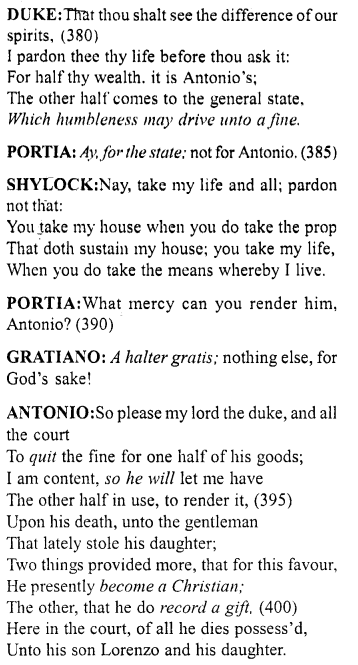
Modern English Reading
DUKE : So that you shall see the difference between our beliefs, I give you your life before you ask for it. Because half your wealth is Antonio’s, the other half comes to the general treasury, which your humbleness may bring to an end.
PORTIA : Yes, for the state; not for Antonio.
SHYLOCK : No, take my life and everything, don’t pardon that: you take my house when you take the prop that holds my house up; you take my life when you take the means by which I live.
PORTIA : What mercy can you give him, Antonio?
GRATIANO : A free rope with a nooses; nothing else, for God’s sake!
ANTONIO : So if it pleases my lord, the Duke, and all the court to set the fine for one half of his goods, I am content, as long as he will let me have the other half to use, to give it, on his death, to the gentleman that lately stole his daughter: Two things more, that, for this favor, he presently becomes a Christian; the other, that he records a gift, here in the court, of everything he has when he dies to his son, Lorenzo, and his daughter.
Word Meaning With Annotation
Which humbleness may drive unto a fine : “but a humble attitude on your part may induce the state to accept a fine, instead of taking the full half of your wealth.” This line sets forth the tremendous difference in the fortunes of Shylock. A few minutes ago he was preparing to cut off his pound of flesh; now he is told to go humbly on his knees and beg that his life and a small proportion of his money may be spared. The tables are indeed turned. In no play of Shakespeare’s do we get such a sudden and complete reversal of fortune. Ay, for the state : Portia reminds them that the Duke has power to allow Shylock to keep some of the half which is due to the State, but he has no power to do so in the case of Antonio’s share. Portia thinks that, since Antonio is bankrupt, it is just that he .should receive the Jew’s money” The bitterness of such a decision to Shylock may well be imagined, a halter gratis : a rope free of charge, to hang himself, quit : remit; excuse, so he will : on condition that he will, become a Christian : would be the cruellest blow of all for Shylock, for his adherence to tire Jewish faith has seemed the only point in his nature which redeemed him from being purely mercenary, record a gift : “draw up a legal document for the assignment of property.” Such a’document was called a “deed of gift”.
Original Text
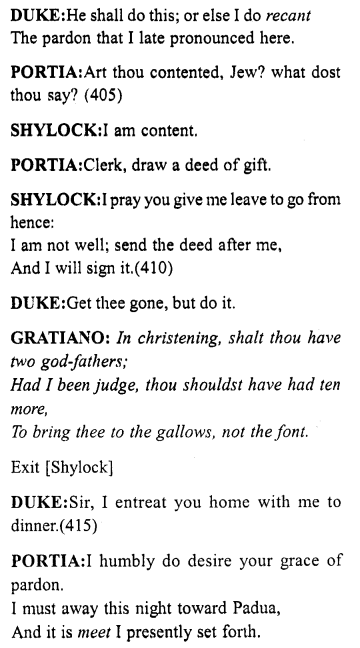
Modern English Reading
DUKE : He shall do this, or else I take back the pardon that I just pronounced here.
PORTIA : Are you content, Jew? What do you say?
SHYLOCK : ! am content.
PORTIA : Clerk, draw up a deed of gift.
SHYLOCK : Please, let me go from here; I am not well; send the deed after me and I’ll sign it.
DUKE : Go, but do it.
GRATIANO : In your christening, you shall have two godfathers; If I had been the judge, you should have had ten more, to bring you to the gallows, not to the baptismal font.
Exit [Shylock]
DUKE : Sir, I beg you to come home with me to dinner.
PORTIA : I humbly desire your Grace’s pardon;I must go away tonight toward Padua, and it is proper that I leave right away.
Word Meaning With Annotation
Reacant : “to deny one’s faith” or to deny previous expressions of belief. The best sense here is “withdraw”. In christening, shalt thou have two god-fathers; had I been judge, thou shouldst have had ten more, to bring thee to the gallows, not the font : Gratiano again gives vent to his brutal wit. He alludes to the fact that when a man is christened, or admitted to the Christian faith by baptism with water, it is necessary for him to have two godfathers, responsible men who will be Iris sponsors, and see that he grows up a good Christian. Shylock has been compelled to accept the Christian faith and so will have two godfathers, but Gratiano says that if he had been judge, he would have sent Shylock before a jury of the usual twelve, who would have condemned him to be hanged. The “font” is a bowl on a raised platform or pedestal, containing holy water for the, ceremony of baptism. It is the same word as “fountain”. The custom of having twelve members of a jury was, of course, purely English. Meet : necessary.
Original Text
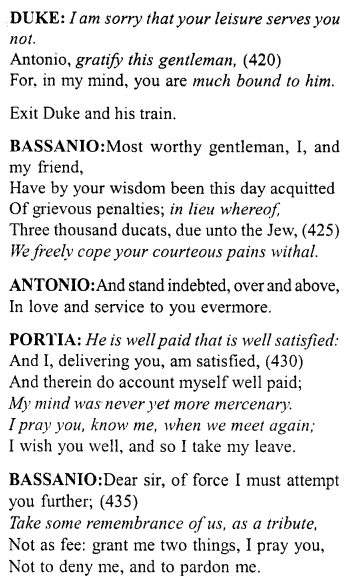
Modern English Reading
DUKE : I am sorry that you cannot stay. Antonio, thank this gentleman, because, in my opinion, you owe him a lot.
Exit Duke and his train.
BASSANIO : Most worthy gentleman, my friend and I Have been acquitted today of grievous penalties by your wisdom; instead of three thousand ducats, due to the Jew, we will freely pay for your courteous pains.
ANTONIO : And stand indebted, over and above, in love and service to you forever.
PORTIA : He is well paid that is well satisfied; and I am satisfied in delivering you, and therefore, I consider myself well paid : my mind never wanted anything else in payment. Please, recognize me when we meet again: I wish you well, and so I say goodbye.
BASSANIO : Dear sir, I must attempt to pay you more forcefully; take some remembrance of us, as a tribute, not as fee. Grant me two things, please: Don’t say no to me and pardon me.
Word Meaning With Annotation
I am sorry that your leisure serves you not : I am sorry that you do not have the leisure time to come, gratify this gentleman : “reward this gentleman”, much bound to him : under a deep obligation to him.” In lieu whereof : “in requital of your services.” we freely cope your pains withal : “we freely remunerate you for your kindly labours.” he is well paid that is well satisfied : this is an example of Shakespeare’s felicity of phrasing, and his power of expressing universal truths in a condensed and epigrammatic manner, my mind was never yet more mercenary : my mind was never desirous of any greater reward than this.” I pray you, know me, when we meet again : “Please do not forget me, if ever we should chance to meet again.” But the words have a deeper significance for the audience than for Bassanio, since they know that the lawyer is Portia, while he does not. So this is another of the numerous instances of skilful dramatic irony in which this play abounds.” take some remembrance of us, as a tribute : “Take some souvenir from us as a token of our esteem.” Bassanio asks Portia to accept some trifling present, in token of remembrance of their gratitude. This leads up to the final episode of the play, which provides a considerable amount of humour, namely, Portia’s success in persuading her husband to part with the ring she had given him. The last shade of tragedy has now left the play, and all the subsequent action is light-hearted and joyous,
Original Text
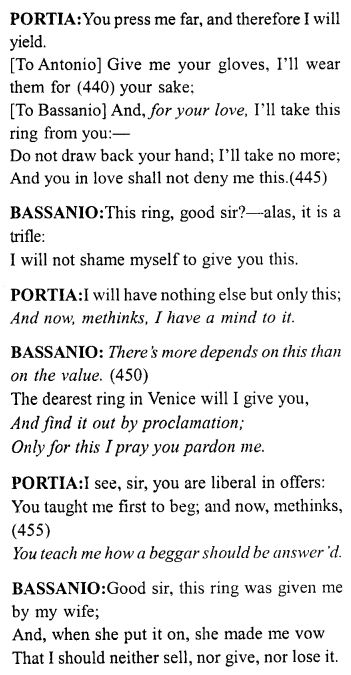
Modern English Reading
PORTIA : You push me far, and so I’ll give in. Give me your gloves; I’ll wear them for your sake. And, for your friendship, I’ll take this ring from you. Don’t draw back your hand; I’ll take no more; and you shall not deny me this in friendship.
BASSANIO : This ring, good sir? Alas, it is a trifle; I won’t embarrass myself to give you this.
PORTIA : I’ÌI have nothing else except this only; And now, I think, I have a mind to have it.
BASSANIO : There’s more that depends on this ring than its value. I will give you the most expensive in Venice, and find out where it is by proclamation: only for this ring, please, excuse me.
PORTIA : I see, sir, you are free in making offers; you taught me to beg first, and now I think you teach me how to answer a beggar.
BASSANIO : Good sir, this ring was given me by my wife; and, when she put it on, she made me vow that I should not sell, or give, or lose it.
Word Meaning With Annotation
For your love : as a souvenir of your friendship, and now, methinks, I have a mind to it : Portia mischievously proceeds to make her request more pointed and difficult to refuse, by saying that it is not merely an accidental choice that made her hit upon the ring, but the fact that she really has a strong desire to have it. There’s more depends on this than on the value : “This ring is of sentimental, rather than intrinsic value.” and find it but by proclamation : he will cause it to be proclaimed in Venice that he wishes to buy an expensive ring, so that he may receive specimens from the various jewellers and select the best one. only for this I pray you pardon me : but excuse me from giving this one thing, you teach me how a beggar should be answer’d : and now you refuse me, as one usally does a beggar.
Original Text
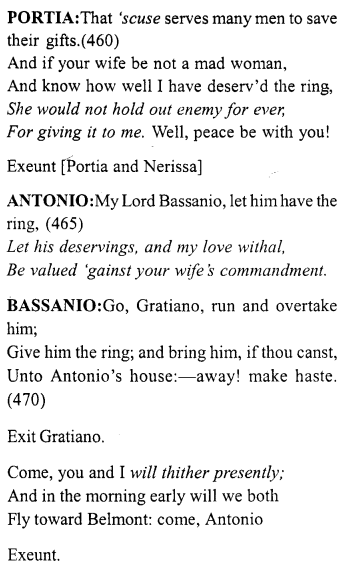
Modern English Reading
PORTIA : That’s the excuse many men use to save their gifts. And, if your wife is not a mad woman, and knows how much I have deserved this ring, she would not hold out in being your enemy forever for giving it to me. Well, goodbye!
Exeunt [Portia and Nerissa]
ANTONIO : My Lord Bassanio, let him have the ring: Let what he deserves, and with my friendship, be measured against your wife’s commandment.
BASSANIO : Go, Gratiano, run and catch him; Give him the ring, and bring him, if you can, to Antonio’s house. Away! Hurry up. Come, you and I’ll will leave presently; and early in the morning, we will both fly toward Belmont. Come, Antonio.
Exeunt.
Word Meaning With Annotation
Scuse : a contracted fonn of “excuse.” she would not hold out enemy for ever for giving it to me : “she might be angry on first hearing of it, but she would not retain her anger for long when she had heard Bassanio’s explanation.” Portia’s reasons are skilful and sound, and make Bassanio appear very mean in refusing such a simple request. She goes away in a mood of hurt and offended dignity, yet full of quiet courtesy, and makes Bassanio look even more discourteous, let his deservings, and my love withal, be valued ‘gainst your wife’s commandment : “let his great services to us, combined with your love for me, be stronger that the command which your wife gave you.” will thither presently : will go there at once.
For More Resources
